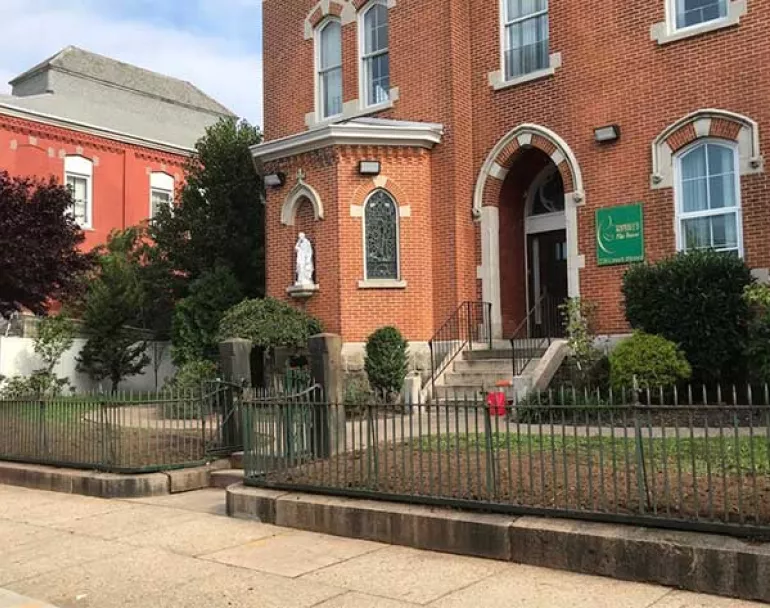Long-Term Support for Young People Facing Homelessness
The most positive outcomes for youth happen when they remain connected and stably housed. Our staff support each young person on their journey toward sustainable independence and a hope-filled future.

Long-Term Support Helps Youth Experiencing Homelessness Achieve Lifelong Stability
Our programs and services are designed to meet immediate and long-term goals.
Young people arrive at Covenant House with an array of lived experiences, including:
- Foster care
- Family trauma
- Substance use
- Mental health issues
- Domestic violence
- Sexual abuse
- Human trafficking
Youth may come to us scarred by anti-LGBTQ+ discrimination and violence, or as parents of small children, or pregnant. Our staff meet them where they are and accompany them on their journey to wholeness and independence.
We contemplate every detail on the journey of a young person in our care: nourishing food, safe and beautiful surroundings, medical and mental health care, life skills, and recreation. Our high-quality programs and services help youth consider their longer-term goals for education, employment, career planning, along with transitional and permanent housing.
We Help Young People Transform Their Lives
This year, Covenant House will provide nearly 800,000 nights of housing. The average length of stay in our residential programs is 54 days in our short-term shelter and 264 days in our transitional housing.

What Is Transitional Housing?
Covenant House’s transitional housing programs provide young people facing homelessness with a stable, dependable, and safe place to live for an extended period of time while also providing them with case management and critical supportive services. Transitional living programs are a proven means to help youth move from homelessness to lifelong stability.
Our transitional housing programs, often referred to as “Rights of Passage” or ROP, are where young people take steps toward independence. Youth live in ROP for 18-24 months, where they tap their potential and plan for the future. Here they build basic life skills and financial literacy, participate in educational and vocational programs, seek employment with long-term advancement and career prospects, and work toward moving into their own safe and stable housing.
Our Research Proves Transitional Housing Works
In 2021, Covenant House, along with sister organizations Schoolhouse Connection and National Network for Youth, conducted a study where we analyzed outcomes for 564 young people who exited our Covenant House transitional living programs in 15 U.S. cities over the course of 12 months. Of those 564 youth, 73% exited the program to stable housing, and 69% were employed or enrolled in school when they left the program.

Find a Transitional Living Program
Covenant House has transitional living programs across the United States, Canada, and Mexico, serving more than 500 youth each night on their path to independence. They are located in:
- ALASKA: Anchorage
- CALIFORNIA: Los Angeles, Oakland, Santa Clara
- FLORIDA: Fort Lauderdale, Orlando
- GEORGIA: Atlanta
- LOUISIANA: New Orleans
- MARYLAND: Prince George’s County
- MICHIGAN: Detroit
- MISSOURI: St. Louis
- NEW JERSEY: Asbury Park, Atlantic City, Elizabeth, Montclair, Newark
- NEW YORK: New York City
- PENNSYLVANIA: Philadelphia
- TEXAS: Houston
- WASHINGTON, D.C.
- CANADA: Toronto, Vancouver
- MEXICO: Mexico City

Transitional Housing is Essential for Youth Experiencing Homelessness
Youth who access transitional housing experience positive outcomes related to housing, employment, education, and access to services.

“I have a plan now. I have something to begin with. I still have some stuff going on, but I have more confidence, and I can face it. I can find a solution."

“My case manager Marquette is teaching me how to be financially stable, how to have more patience, helping me build up my communications skills, and realizing that this is a once-in-a-lifetime opportunity, so you better take advantage of it!”

“I would never in a million years have thought, given my circumstances, that at the end of this journey I would end up with my dream career.”
Know the Issues That Drive Youth Homelessness
Young people experiencing homelessness face numerous challenges and barriers that hinder their journey toward sustainable independence and a hope-filled future.

Human Trafficking
Children and youth experiencing homelessness are a prime target of human trafficking. Traffickers use violence, threats, deception and other manipulative tactics to trap millions of young people worldwide.

Income Inequality/Poverty
Children raised in poverty face a higher risk of homelessness. Without equitable resources, they can get swept up in a vicious cycle of hardship and significant social disadvantages.

Gaps in Foster Care
When young people age out of foster care and other child welfare services, they become susceptible to homelessness, human trafficking, and other threats to their well-being.

Lack of Affordable Housing
Young people experiencing homelessness are often ill-prepared to find and hold a job that can cover their housing costs. The lack of available affordable housing greatly compounds this issue.

Mental and Emotional Health
Homelessness takes an enormous toll—both physically and mentally—on young people. Each year, thousands of youth experiencing homelessness die on the streets due to illness, assault, or suicide.

Racial Discrimination
Racial discrimination is a pipeline to youth homelessness. People of color experience homelessness at higher rates, largely due to long-standing structural racism that impacts education, housing, and other inequities.
Support Long-Term Support Services
Your gift today provides more services and support to young person on their journey toward sustainable independence and a hope-filled future.


